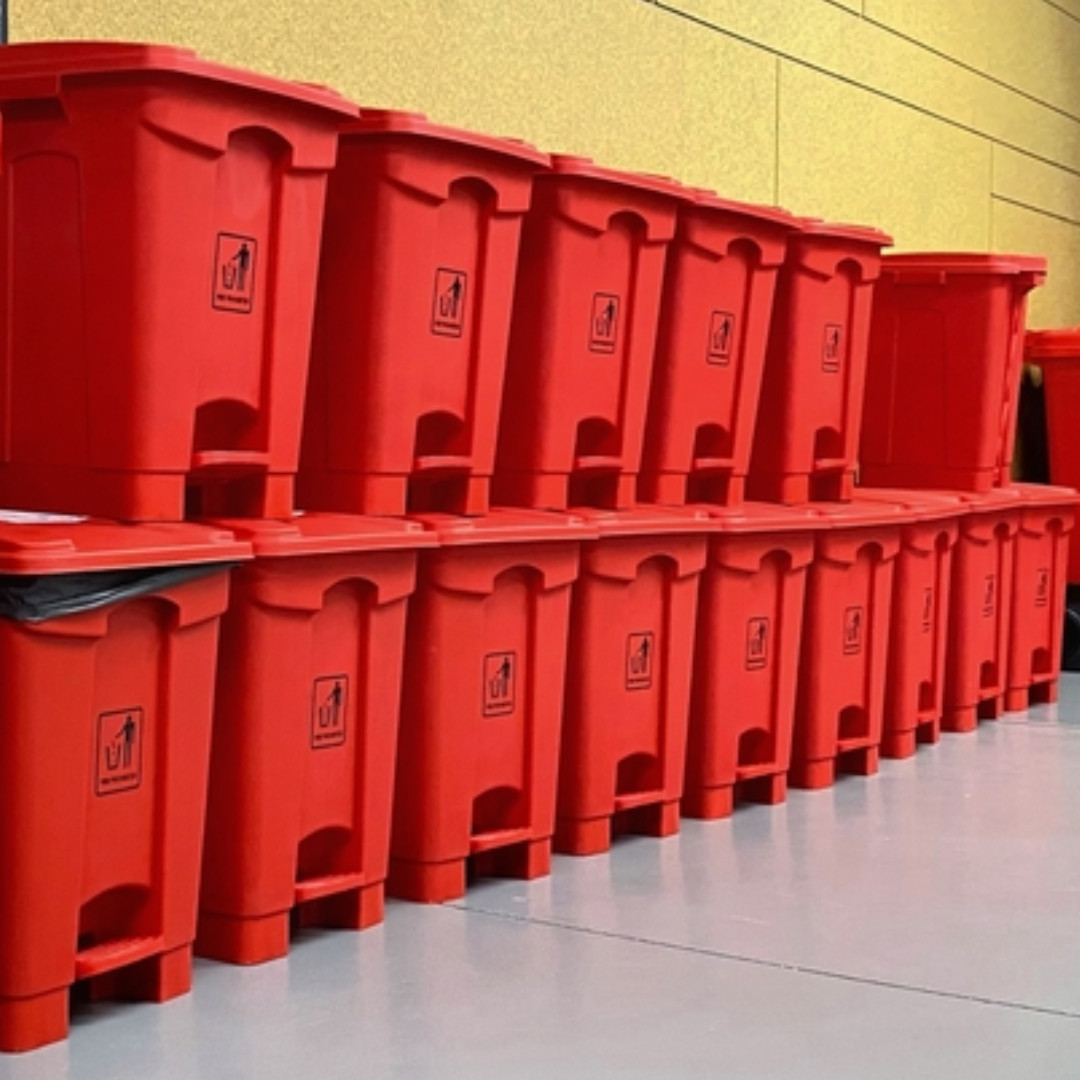Needle disposal boxes in bathrooms on college campuses provide a safe receptacle where students who take injectable medications can discard their used needles.
College students who use injectable medications while on campus often face a difficult conundrum: Do they toss their used needles in campus trash cans, posing a health risk to custodial staff, or carry them around campus until they can safely dispose of them, running the risk of accidently poking themselves or others in the process?
Neither option is the correct way to dispose of needles and syringes; the Food and Drug Administration recommends storing used hypodermic needles in designated sharps containers—hard plastic boxes sold at pharmacies and medical supply stores. The impermeable containers, which must be taken to designated sites for collection, help prevent accidental contact with used needles.
But personal sharps containers are unaffordable for some students, while others—especially those who recently started taking injectable medications—may not even be aware of proper needle-disposal protocols.
That’s why some colleges have installed containers on campus, primarily in bathrooms, to allow students to dispose of their needles safely and conveniently.
Central College, a small private institution in Iowa, has had needle-disposal receptacles in high-traffic areas on campus for about six years. The locations include bathrooms in the student center, the dining center, a residence hall and other locations on campus.
Administrators say it has proven to be an effective resource for students, and that the boxes usually get filled.
“I have never had a student ask for another location,” said Melissa Sharkey, assistant dean of students. “We know they’re in the right places because they’re used. There are sharps in each container.”
Although some schools installed sharps boxes specifically to address problems with dangerous or sloppy needle disposal, Sharkey said Central never faced such issues. Installing the receptacles “was the right thing to do for our students and our community to keep them safe,” she said.
Some colleges and universities that don’t have disposal boxes in bathrooms offer the individual FDA-approved plastic boxes to students free of charge, usually through the health center or residence halls. Students without access to proper disposal receptacles often use hard plastic containers, such as empty laundry detergent bottles, as an alternative.
Diabetic students who routinely inject insulin are perhaps most in need of a safe way to dispose of needles. People with Type 1 diabetes often inject insulin at least twice daily and may need four or more injections. That means most diabetic students taking full course loads will regularly need to inject insulin on campus.
Molly Johannes, community engagement manager for the Diabetes Link, a nonprofit organization aimed at supporting young people with diabetes, noted that students can encounter uncomfortable and potentially dangerous situations when they don’t have access to or aren’t aware of safe ways to discard their needles.
She recalled a story about a student who put her used needles in the garbage can in her dorm room, which resulted in her roommate getting injured by a needle when she took out the trash.
”If someone doesn’t have safe places to put their needles, that creates all sorts of risk,” Johannes said.
Accidental Needle Pricks
Kendra Bass, a senior with Type 1 diabetes at Indiana University of Pennsylvania, couldn’t figure out what to do with her used needles when she started taking class on campus full-time. Her university has needle boxes in many of the bathrooms in the newer buildings, but the building where most of her classes were held only had a few boxes—and some were broken. Initially, she resorted to tossing used needles in her backpack—and ended up getting pricked more than once when emptying her bag at the end of the day. Then she dedicated a single pocket in her backpack to the needles, hoping to avoid stabbing herself, but the needles ended up digging holes in the fabric.
”I did find it very annoying and frustrating to carry those throughout the day,” she said.
These days, she uses DIY disposal containers—usually old peanut jars—to hold her needles but is hopeful that with the construction of new buildings on campus, public sharps boxes will become even more common at IUP.
Transgender students who take injectable hormones also use the boxes to dispose of needles. Although they tend to take hormones far less frequently than diabetics take insulin—typically just a handful of times a month—it’s still helpful for them to have access to public needle-disposal containers.
For one thing, it can help students keep their medical information private, which may not be an option if they request or buy a sharps box from the health center.
“The resources that are easy to find are specifically needle exchanges,” said Steph DeNormand, trans health program manager for Fenway Health, a Massachusetts-based LGBTQ+ health-care organization. And those “seem to be more focused on folks who are injectable drug users,” which creates stigma around using them, said DeNormand, who uses they/them pronouns.
Because of this and other privacy concerns, such as individuals not wanting to out themselves as transgender, “having publicly available access to medical waste disposal … would either help to mitigate or remove the issue of having to ask for a disposable bin,” they said.
Bass concurs that disposal bins in bathrooms can help with privacy; though she doesn’t mind taking her insulin in public at IUP, a small institution where most students and employees know her, she can understand why some people might be more comfortable taking their medication and disposing of their needles in private.
“When I was first diagnosed, I was very timid about giving myself insulin. I had to do it through a pen, and it was a very obvious procedure that I had to go through, and it was scary and I would get people looking at me and giving me weird looks,” said Bass, who also authored a blog post for the Diabetes Link about needle disposal. “Having them in the bathroom is extremely convenient and nice and also helps make everyone feel more comfortable.”
Although needle-disposal boxes on college campuses are typically intended for students who need to inject medication, they have also been implemented in cities around the country to encourage recreational drug users to dispose of needles properly rather than drop them in public spaces. The public disposal boxes are less controversial than free needle exchange programs, in which individuals can drop off used needles and get new ones, which opponents argue condones illegal drug use, increases crime and creates litter.
“It has become a public hazard, and the fact of the matter is that we shouldn’t be creating more of a public hazard around addiction,” said West Virginia senator Eric Tarr, who sponsored a bill that outlawed needle exchanges in 2021. “The effort was valiant and I understand that, but it’s a failed experiment and it needs to go away.”
Johannes said it’s not difficult to convince college administrators to put needle-disposal containers on campus. In her experience, most university disability centers have been willing to help coordinate installation of the containers to support students who consider them an important disability accommodation.
“We encourage all students with diabetes to advocate for their needs,” she said. “It goes towards building that safe relationship between the student and the rest of the school and the rest of the community.”
This post, Safely Disposing of Needles on Campus, was shared by Insider Higher Ed on October 18, 2022.











